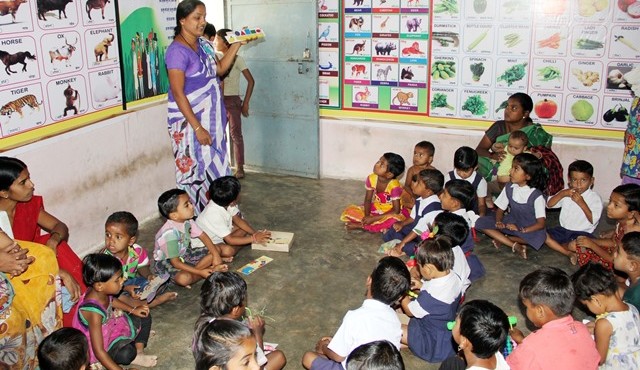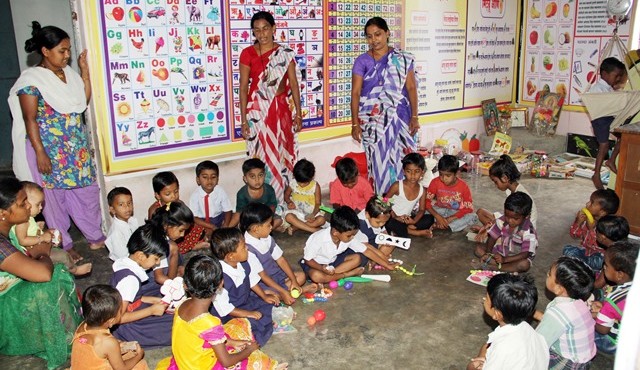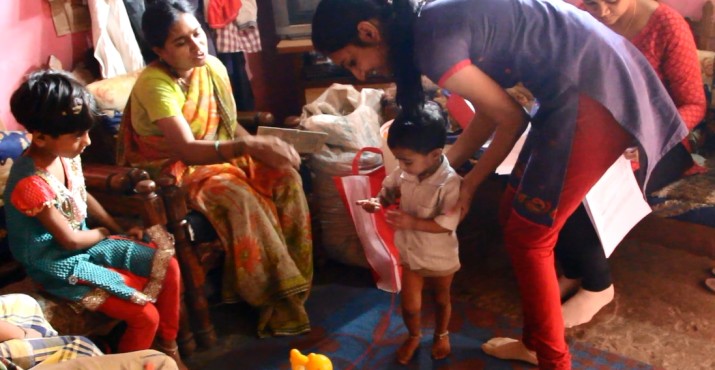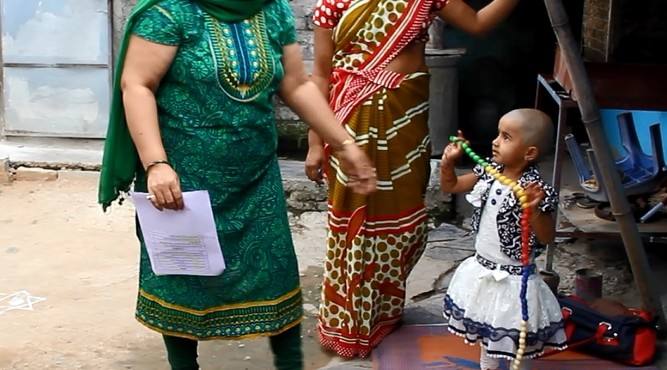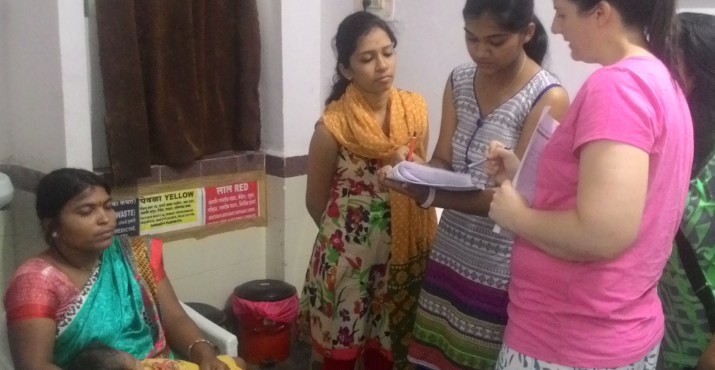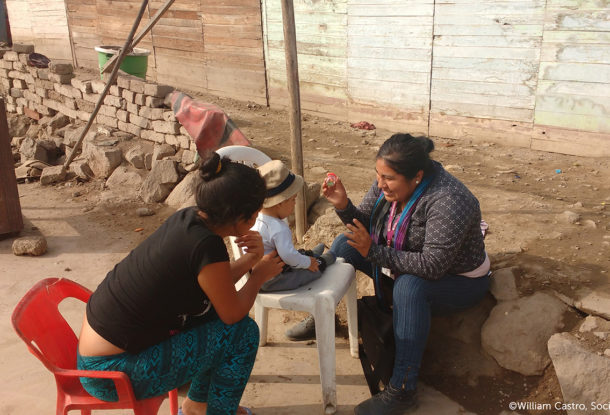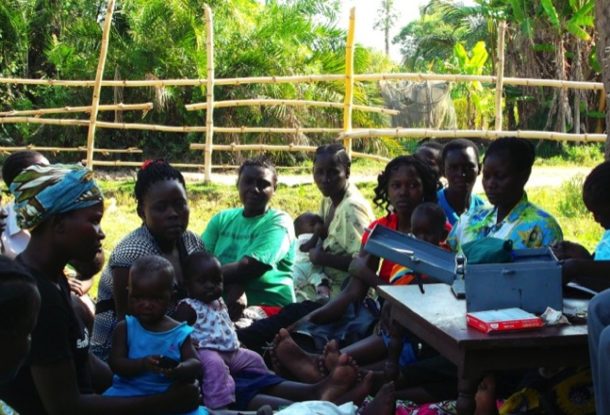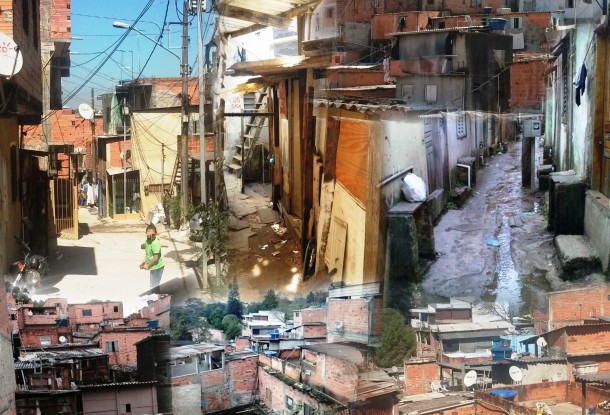Innovation Summary
 In India, Anganwadi workers (AWW), local community based workers under the Integrated Child Development Scheme (ICDS) established in 1975, provide supplementary nutrition, preschool education, nutrition and health education and referral services [1-2]. Despite their significant role in child development, AWW are often overburdened due to administrative and documentation related work. Time at disposition and skills of AWW are major challenges for them to satisfactorily carry out childhood development activities [3].
In India, Anganwadi workers (AWW), local community based workers under the Integrated Child Development Scheme (ICDS) established in 1975, provide supplementary nutrition, preschool education, nutrition and health education and referral services [1-2]. Despite their significant role in child development, AWW are often overburdened due to administrative and documentation related work. Time at disposition and skills of AWW are major challenges for them to satisfactorily carry out childhood development activities [3].
This innovation aims to integrate and enhance existing Anganwadi Program (AWP) with local resources in private education sectors to create a higher impact program for early childhood development of indigenous tribal groups. The project will create enhanced curriculum for early childhood development and use a tablet/PC-based smart register to enable staff to track child progress and optimize health service utilization. The public-private partnership will also spur collaboration between AWP centers and private preschools to guarantee sustainable training and capacity enhancement. Furthermore, partnerships with community colleges and medical schools will enable continuous quality improvement and training. The project aims for improvement on cognitive and behavioural measures for children in the intervention group compared to control group and the attendance of children at Anganwadi Centers (AWC) increase from current 30% to at least 50%.
Gallery
Impact
Expected:
- 1,328 children will be directly enrolled in the intervention
- 25 (100%) Anganwadi workers enrolled in the intervention arm trained to deliver improved curriculum
- 400 (50%) of the total children enrolled in the intervention arm show at least 0.3SD changes in cognitive/behavioural measures compared to the control
An early step for better future.
-Nehal Shah, Project Trainer and Field Supervisor
Innovation
Our innovation is the integration and enhancement of the existing government Anganwadi Program (AWP) and Anganwadi Worker (AWW) with local resources in the private and education sectors to create a higher-impact program for early childhood development (ECD) of indigenous tribal groups. Novel elements are: (1) creation of a tailored curriculum for a family-centered approach and certification of baby-friendly couples (BFC) to increase caregiver capacities for health and ECD; (2) deploying a tablet-PC smart register application as a tool for the AWW to adequately track child growth, ECD and progress through the curriculum, highlight gaps in care for targeted action, and reduce administrative and reporting burdens; (3) creation of training and apprentice partnerships between the public AWP/AWW and private high quality preschools as a mechanism for AWW performance incentives and training including recognition as an upgraded Anganwadi Center (Anganwadi Plus);
(4) establishment of partnerships with local community colleges and medical schools for continuous data driven quality improvement and training. Research Assistants in the project will support the impact evaluation, coordinate between community colleges/medical colleges and private school teachers with the AWW, and provide technical support for the application.
The proof of concept for this project is that the intervention can be effectively delivered through a public-private partnership (shown by attendance in AWC increasing from 30% to at least 50%).
Collaboration
Funders
- Saving Brains Partners
Key Partners
- Meghe Group of Schools, Nagpur, India
- Smt Radhikabai Meghe Memorial College of Nursing, Wardha, India
- Datta Meghe Institute of Engineering, Technology and Research, Wardha, India
- GS Gawande College, Umerkhed, Dist Yavatmal, India
- Harvard T H Chan School of Public Health, USA
- UC Davis, USA
- Public Health Department, Zilla Parishad Wardha and Nagpur
- National Institute of Nutrition, Hyderabad, India
Implementation
Expected drivers:
- Identifying and connecting with influential groups and decision makers needed to successfully implement this work, including the district level chief executive health officer, formal and informal tribal leaders, Anganwadi supervisors and senior level officers at the district level overseeing the Anganwadi worker program. Additional critical officials include the local parliamentarians and State level health officers.
Expected challenges:
- Low fidelity of replication due to non-adherence to the core process, creating complaints amongst the partners as the benefits, financial and otherwise are not realized, and complaints from the beneficiaries that services are not being rendered as intended. Mitigation strategy involves continuous field surveillance and initial formative work to identify specific bottlenecks in implementation.
- Competing with other private preschools.
Continuation
Our primary path to scale is establishment of a functioning public-private partnership as a seed for expansion through franchising and/or promotion of early adopters of the system. This will be facilitated by creating the tools of scalability including the family centered curriculum, training and supervision tools, the smart register tablet PC application, governance framework and core network that others can join to launch their own partnership. Establishment of the initial centers is critical as a demonstration and training site.
Evaluation Methods
We will use a cluster randomized controlled trial to evaluate the impact of the intervention. We will include 50 AWC, randomly allocated to either intervention or control arm. We anticipate equal distribution of unaccounted variables across both groups. The baseline comparability will be assessed as a proxy for general comparability.
The intervention group will receive the intervention as described in steps 1-7 below, and the control will receive the standard Anganwadi Worker Program. Information on the fidelity of implementation related to training and deployment will be collected. Attendance of children at the AWC, engagement with parents and use of the smart register application to manage clients and provide customized feedback to parents will also be tracked.
Proposed intervention:
Step 1: to develop an enhanced AWP curriculum through integration and adaptation of early childhood education tools. The curriculum will be family-focused with a substantial parental role in child interaction skills and a supportive home environment.
Step 2: training and certification of staff to deliver the new curriculum and procedures, first for private preschool teachers who will also be trained as mentors, and then for AWW.
Step 3: concurrent with Step 2, we will develop the smart register application and tablet PCs for the AWW to manage their clients.
Step 4: the AWW in tribal areas will “go live” with enhanced curriculum, BFC sessions and tablets.
Step 5: private preschool teachers will begin their role as mentors by visiting AWC/AWW for coaching and quality assessments.
Step 6: engaging local academics and scholars at a local college/medical school and train them to review the AWW register data, and analyse and identify service gaps.
Step 7: monthly community meetings held with the AWW, supervisors, mentors from the private preschools, academics and community members. At these meetings the stakeholders discuss the successes and failures at the AWC/AWW and formulate a plan to improve services based on the data.
Impact of Innovation
We anticipate that in the intervention arm, the proportion of parents with BFC certification will increase. This may consequentially contribute to the overall improvement in the attendance of children at AWC as well as cognitive and behavioural improvement in children in the intervention group compared to the control group.
We expect that all children enrolled in the intervention arm will have some improvement in cognitive and behavioural measures, and that at least half of them (i.e. 400) will have a change of 0.3SD in cognitive and behavioural measures compared to control arm. The other expected outcome will be that a significantly larger proportion of children from the intervention group will fall in the average or above average level of achievement than those in the control arm.
References
Resources
-
Research
-
Abubakar, A., Holding, P., Van Baar, A., Newton, C., Van de Vijver, F., & Espy, K. (2013). The Performance of Children Prenatally Exposed to HIV on the A-Not-B Task in Kilifi, Kenya: A Preliminary Study. International journal of environmental research and public health, 10(9), 4132-4142.
-
Bevc, I. (2004). Learning Through Play: an international early intervention programe for infants, children and their families. In S. Saxena & P. J. Garrison (Eds.), Mental Health Promotion.
-
Case Studies from Countries. Geneva: World Health Organization
-
Briggs-Gowan, M. J., & Carter, A. S. (2002). Brief infant-toddler social and emotional assessment (BITSEA) manual, version 2.0. New Haven, CT: Yale University
-
Fenson, L., Marchman, V. A., Thal, D., Dale, P. S., Reznick, J. S., & Bates, E. (2007). The MacArthur-Bates Communicative Development Inventories, Second Edition: User's Guide and Technical Manual. Balti-more: Paul H. Brookes Publishing Co
-
Glascoe, F. P. (2003). Parents' Evaluation of Developmental Status: Pediatric Society of New York
-
Newnham, C. A., Milgrom, J., & Skouteris, H. (2009). Effectiveness of a modified Mother-Infant Transac-tion Program on outcomes for preterm infants from 3 to 24 months of age. Infant Behavior & Develop-ment, 32(1), 17-26. doi: 10.1016/j.infbeh.2008.09.004
-
Prado, E. L., Abubakar, A. A., Abbeddou, S., Jimenez, E. Y., Some, J. W., & Ouedraogo, J. B. (2014). Ex-tending the Developmental Milestones Checklist for use in a different context in Sub-Saharan Africa. Acta paediatrica, 103(4), 447-454. doi: 10.1111/apa.12540
-
Ramey, C. T., Sparling, J. J., & Ramey, S. L. (2012). Abecedarian: the ideas, the approach, the findings. Los Altos, CA: Sociometrics Corporation.
-
Rauh, V. A., Nurcombe, B., Achenbach, T., & Howell, C. (1990). The Mother-Infant Transaction Program. The content and implications of an intervention for the mothers of low-birthweight infants. Clinics in perinatology, 17(1), 31-45.
-
Squires, J., & Bricker, D. (2009). Ages and Stages Questionnaires, Third Edition (ASQ-3). Baltimore, MD: Brookes Publishing.
-
-
Instruments and Batteries
-
Developmental Milestones Checklist (DMC –III)
-
Profile of Socio-Emotional Development (PSED)
-
A not B task
-
Windows test (Measures executive function)
-
Bayley Scales of Infant Development (BSID)
-
Home Observation for the Measurement of the Environment (HOME) Inventory
-
Center for Epidemiological Studies – Depression Test (Maternal depression)
-
Generalized Self-Efficacy Scale (Maternal Agency)
-
